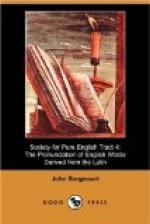It will be seen that the Latin sounds were throughout frankly Anglicized. According to Burney a like principle was followed by Burke when he read French poetry aloud. He read it as though it were English. Thus on his lips the French word comment was pronounced as the English word comment.
The rule that overrode all others, though it has the exceptions given below, was that vowels and any other diphthongs than au and eu, if they were followed by two consonants, were pronounced short. Thus a in magnus, though long in classical Latin, was pronounced as in our ‘magnitude’, and e in census, in Greek transcription represented by [Greek: eta], was pronounced short, as it is when borrowed into English. So were the penultimate vowels in villa, nullus, c[ae]spes.
This rule of shortening the vowel before two consonants held good even when in fact only one was pronounced, as in nullus and other words where a double consonant was written and in Italian pronounced.
Moreover, the parasitic y was treated as a consonant, hence our ‘v[)a]cuum’.
In the penultima qu was treated as a single consonant, so that the vowel was pronounced long in [=a]quam, [=e]quam, in[=i]quam, l[=o]quor. So it was after o, hence our ‘coll[=o]quial’; but in earlier syllables than the penultima qu was treated as a double consonant, hence our ‘sub[)a]queous’, ‘equity’, ‘iniquity’.
EXCEPTIONS.
1. When the former of the two consonants was r and the latter another consonant than r, as in the series represented by larva, verbum, circus, corpus, laburnum, the vowels are a separate class of long vowels, though not really recognized as such. Of course our ancestors and the Gradus marked them long because in verse the vowel with the two consonants makes a long unit.
2. A fully stressed vowel before a mute and r, or before d or pl, was pronounced long in the penultima. Latin examples are labrum, Hebrum, librum, probrum, rubrum, acrem, cedrum, vafrum, agrum, pigrum, aprum, veprem, patrem, citrum, utrum, triplus, duplex, Cyclops. Moreover, in other syllables than the penultima the vowel in the same combinations was pronounced long if the two following vowels had no consonant between them, as patria, Hadria, acrius. (Our ‘triple’ comes from triplum and is a duplicate of ‘treble’. Perhaps the short vowel is due to its passage through French. Our ‘citron’ comes from citronem, in which i was short.)
3. The preposition and adverb post was pronounced with a long vowel both by itself and in composition with verbs, but its adjectives did not follow suit. Hence we say in English ‘p[=o]stpone’, but ‘p[)o]sterior’ and ‘p[)o]sthumous’.




